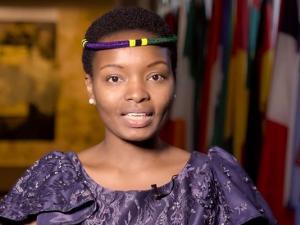
Tanzanian gets UN award for fight against child marriage
A Tanzanian was Tuesday honoured by the United Nations for leading a campaign to overturn a law that allowed girls to be married as early as the age of 14.
Rebeca Gyumi was among four recipients of the UN human rights prize awarded once every five years.
"This is a testament that girls, wherever they are, can be anything without limits," Ms Gyumi said after receiving the award.
Tanzanian activists, she added, are striving to create an environment "in which a girl child can unleash her full potential without thinking that the next day a parent will come and say, 'We have a husband for you.'"
Ms Gyumi, a 31-year-old lawyer, was instrumental in winning a High Court ruling two years ago that struck down the girl-child-marriage provision in the country's 1971 Marriage Act.
It had set the minimum age of marriage at 18 for boys and at 14 for girls.
Nearly 40 percent of Tanzanian girls had married before their 18th birthday, Ms Gyumi noted at a panel discussion at UN headquarters. And about 25 percent of Tanzanian girls aged 15-19 have given birth, she added.
While girls in Tanzania have nearly achieved parity with boys in primary-school enrolment, a gender gap emerges at the secondary level, Ms Gyumi said. Many girls drop out of school when they become pregnant, she noted.
Pregnant girls can also be expelled from school in Tanzania.
President John Magufuli defended such bans in a speech last year.
"As long as I am president," he declared, "no pregnant student will be allowed to return to school …. After getting pregnant, you are done.”
In response, the World Bank announced last month that it would not move forward with a $300 million loan to Tanzania intended to improve access to secondary education until the government demonstrates its commitment to girls’ education.
Fundamentalism
It is not only in her home country that human rights are under attack, Ms Gyumi warned.
"In many places all over the world we are seeing the rising of fundamentalism, the rising of really repressive laws and legislation," she said.
Among the other winners of the UN rights award were Asma Jahangir of Pakistan who died earlier this year after many years of campaigning against religious extremism.
Also honoured was Joenia Wapizana, a Brazilian who advocates for the rights of indigenous communities.
Front Line Defenders, an Irish NGO that seeks to protect human-rights activists in dangerous circumstances, was recognised as well.
Kevin J Kelley
